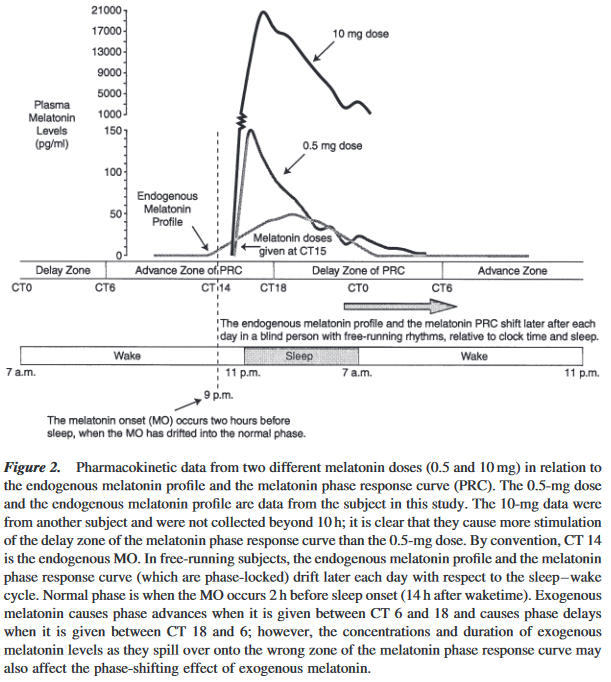For those looking into or presently taking daytime especially large doses of melatonin, you may want to research its effect on prolactin secretion. Then elevated prolactins effect of HTPA i.e sex hormone feedback control. Natural melatonin release is photoperiod specific. And as such has defined window. When taken outside that context especially in large doses it can create untoward effects. Such as effects on BG and IR. The latter is the effect of most concern to me with daytime high dose use. Tge other quotes and info are just wwarness of the broad reaching effects some may not be aware of.
I personally do not use melatoinin outside the sleep window effect and with a max dosage of 5mg sustained released.
" On the one hand, melatonin was tested with some success as a contraceptive [5]. In a controlled trial, 3 mg. melatonin at bedtime evidently suppressed LH in younger women as compared to placebo,"
"Several conditions of inadequate gonadal function or amenorrhea may be associated with enhanced endogenous melatonin production, "
“Melatonin decreased LH in men in one study, [13] and melatonin impaired sperm production in two young men studies”
"The current study was planned as an expanded test of the hypothesis that melatonin could suppress LH and relieve hot flashes by suppression of the hypothalamic pulse generator. "
Point being melatonin during the night time sleep period has a positive overall effect but daytime there are clear side effects that I personally would not want unless I had some condition that made the trade off acceptable. This seems especially true when the elevated melatonin levels is concurrent with food intake. Its this latter one that got my attention especially as we age.
**“Exogenous melatonin at doses of 1–10mg has been shown to worsen glucose tolerance and insulin sensitivity compared to placebo in men as well as in pre- and post-menopausal women after a single dose and persisting after up to 3 months of treatment.**75–77 However, as melatonin is usually not administered during the waking hours when food is consumed, the risk of clinically significant effects on glucose tolerance is likely to be minimal.”
My context of research was specifically male targeted. In women its much more complex between pre post menopausal. As with female reproduction timing has avsignificant and even opposing effects. Day reltive to cycle as well as time of day and curve duration. I have not dug too deep into it.
I want people to be aware of the melatonin prolactin relationship and the latters effects when chronically supplemented during waking/light hours. But specifically its effect with daytime adminstration and food intake on blood glucose and hepatic insulin senstivity. There are certainly many benefits from adjusting sleep start end (wake) cycle period to inflammation antioxidant etc. All the negative effects seem associated with daytime use.
Lauritzen ES, Kampmann U, Pedersen MGB, et al. Three months of melatonin treatment reduces insulin sensitivity in patients with type 2 diabetes—A randomized placebo-controlled crossover trial. J Pineal Res. 2022;73:e12809. doi: 10.1111/jpi.12809
Cagnacci A, Arangino S, Renzi A, et al. Influence of melatonin administration on glucose tolerance and insulin sensitivity of postmenopausal women. Clin Endocrinol. 2001;54(3):339–346. doi: 10.1046/j.1365-2265.2001.01232.x
Luboshitzky R, Shen-Orr Z, Shochat T, Herer P, Lavie P. Melatonin administered in the afternoon decreases next-day luteinizing hormone levels in men. Journal of Molecular Neuroscience.
1999:75–80. doi: 10.1385/JMN:12:1:75.
Luboshitzky R, Shen-Orr Z, Nave R, Lavi S, Lavie P. Melatonin administration alters semen quality in healthy men. J Androl. 2002;23:572–578.
Cohen M, van Heusden AM, Verdonk HER, Wijnhamer P. Melatonin/Norethisterone contraception. In: Touitou Y, Arendt J and Pevet P, editor. Melatonin and the Pineal Gland- From Basic Science to Clinical Application. Amsterdam, Elsevier Science Publishers; 1993. pp. 339–345.
Melatonin effects on luteinizing hormone in postmenopausal women: a pilot clinical trial


